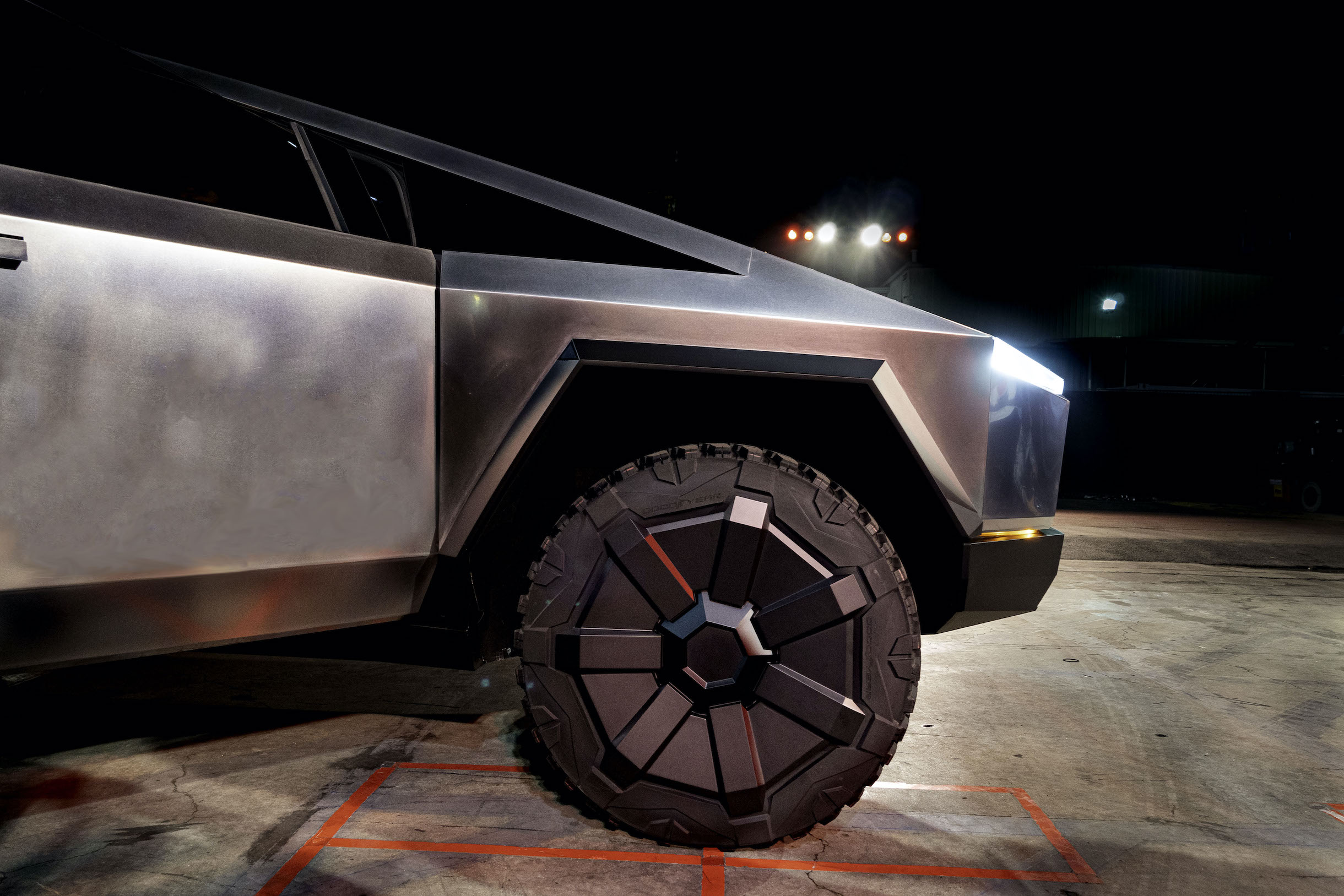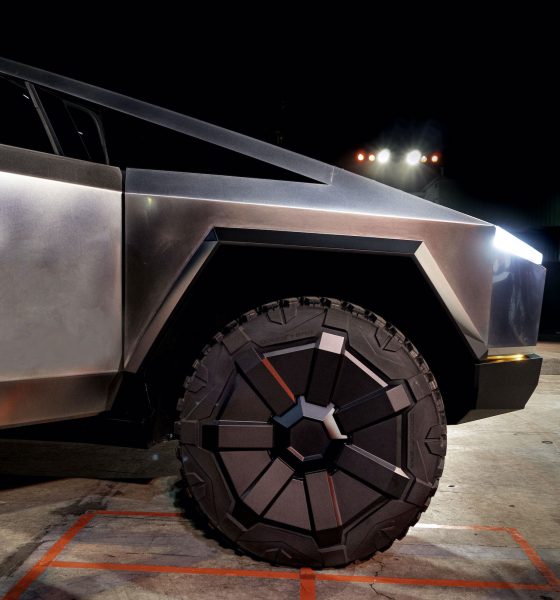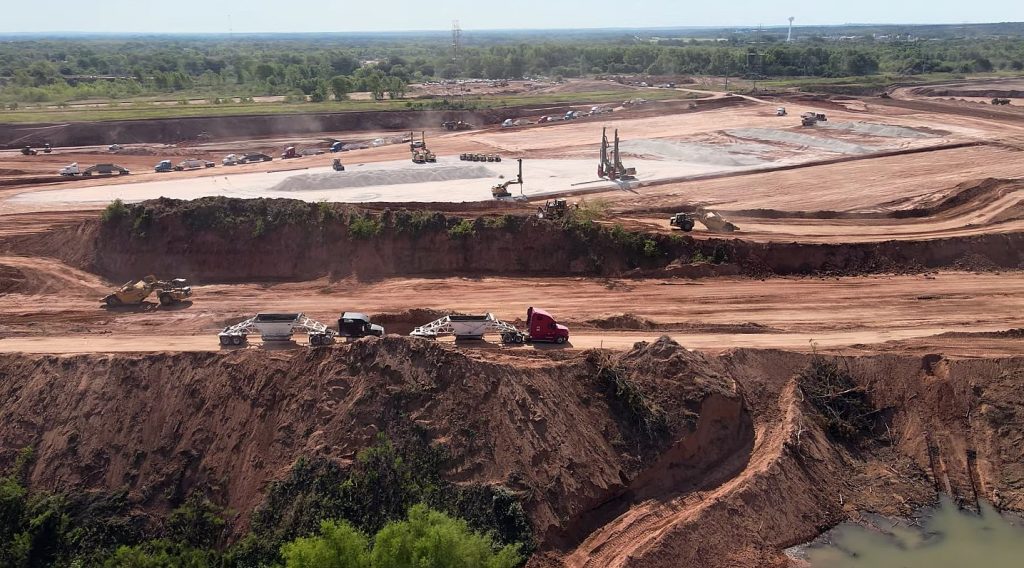

News
Tesla Cybertruck poised to start trial production runs in Giga Texas in May 2021
Tesla’s Gigafactory Texas is being built in an incredibly rapid manner, seemingly matching or perhaps even exceeding the pace of Gigafactory Berlin, which is looking to start Model Y production next year. If a recent presentation from Tesla is any indication, it appears that the expedited activities in the Giga Texas complex are intended, as the company seems to be looking to start the Cybertruck’s trial production as early as May 2021.
Tesla recently presented its “Travis County Colorado River Project Partner Pre‐Qualification Presentation,” which included a rough timeframe for the upcoming Cybertruck and Semi factory. The presentation, which was posted on the website of the City of Austin and shared by Tesla Motors Club member hridge20, revealed that Giga Texas’ “First Dry-In” is set for December 30, 2020, and its “First Substantial Completion” is scheduled for May 1, 2021.
As noted in an Inspectapedia post, “dry-in” typically means that a building’s shell has been completed to a sufficient degree, allowing the facility and its interior to avoid damage from rain, wind, and other weather-related factors. At the dry-in stage, the installation of weather-sensitive materials and equipment could commence, which, in Tesla’s case, may refer to the Cybertruck’s production equipment.

“First Substantial Completion,” on the other hand, refers to the stage when a construction project is completed to a degree where it could be used for its intended purpose. With this in mind, it appears that Tesla is looking to have the installation of the Cybertruck’s production equipment done by May, allowing the company to start trial runs of the all-electric pickup truck before the end of the second quarter of 2021.
Granted, this is a very aggressive target. However, the equipment for the Cybertruck’s production line may require less time to set up compared to the Model 3 and Model Y line in Fremont and Shanghai, since the vehicle will use no stamping machines due to its XY design. The Cybertruck will not need a paint shop either, thanks to its steel exoskeleton.
If Tesla’s recent presentation proves accurate, the company could definitely be on pace to hit its self-imposed target for the start of Cybertruck deliveries. Currently, Tesla estimates that Cybertruck deliveries could begin in late 2021, with the Tri-Motor AWD and Dual-Motor AWD variants being rolled out first. The base Cybertruck, which will cost less than $40,000, is expected to be rolled out the following year.
Considering the targets outlined in Tesla’s recent Travis County presentation and the Cybertruck’s estimated delivery dates, it appears that the electric car maker is actually adopting a pretty conservative rollout target for the all-electric pickup. If trial production could begin in May 2021, after all, Tesla will have the rest of the year to refine and release the Cybertruck. Starting trial production in the second quarter of 2021 also allows the company to gain some momentum in the EV market, which could be strategic considering that the first all-electric pickup, the Rivian R1T, is poised to start deliveries in June 2021.
Tesla’s “Travis County Colorado River Project Partner Pre‐Qualification Presentation” could be accessed below.
Tesla Partner Prequalification Presentation- August 27 2020 by Simon Alvarez on Scribd

News
Tesla ships out update that brings massive change to two big features
“This change only updates the name of certain features and text in your vehicle,” the company wrote in Release Notes for the update, “and does not change the way your features behave.”

Tesla has shipped out an update for its vehicles that was caused specifically by a California lawsuit that threatened the company’s ability to sell cars because of how it named its driver assistance suite.
Tesla shipped out Software Update 2026.2.9 starting last week; we received it already, and it only brings a few minor changes, mostly related to how things are referenced.
“This change only updates the name of certain features and text in your vehicle,” the company wrote in Release Notes for the update, “and does not change the way your features behave.”
The following changes came to Tesla vehicles in the update:
- Navigate on Autopilot has now been renamed to Navigate on Autosteer
- FSD Computer has been renamed to AI Computer
Tesla faced a 30-day sales suspension in California after the state’s Department of Motor Vehicles stated the company had to come into compliance regarding the marketing of its automated driving features.
The agency confirmed on February 18 that it had taken a “corrective action” to resolve the issue. That corrective action was renaming certain parts of its ADAS.
Tesla discontinued its standalone Autopilot offering in January and ramped up the marketing of Full Self-Driving Supervised. Tesla had said on X that the issue with naming “was a ‘consumer protection’ order about the use of the term ‘Autopilot’ in a case where not one single customer came forward to say there’s a problem.”
This was a “consumer protection” order about the use of the term “Autopilot” in a case where not one single customer came forward to say there’s a problem.
Sales in California will continue uninterrupted.
— Tesla North America (@tesla_na) December 17, 2025
It is now compliant with the wishes of the California DMV, and we’re all dealing with it now.
This was the first primary dispute over the terminology of Full Self-Driving, but it has undergone some scrutiny at the federal level, as some government officials have claimed the suite has “deceptive” names. Previous Transportation Secretary Pete Buttigieg was one of those federal-level employees who had an issue with the names “Autopilot” and “Full Self-Driving.”
Tesla sued the California DMV over the ruling last week.
News
Tesla workers push back against Giga Berlin unionization
“IG Metall did not succeed in Giga Berlin‘s works council election earlier today. The union share was reduced from nearly 40% in 2024 to 31% in 2026! This is a clear message by the Giga Berlin team towards an independent co-determination! The list called Giga United, led by the current chairwoman, Michaela Schmitz, received the most votes with more than 40%! Good news for Giga Berlin!”

Tesla workers pushed back against unionization efforts at Gigafactory Berlin, and over the past few years, there has been a dramatic decrease in interest to unionize at the German plant.
Gigafactory Berlin Plant Manager André Thierig announced on Wednesday that IG Metall, the European union group, saw its share reduce from 40 to 31 percent in 2026 as employees eligible to vote on the issue. Instead, the Giga Berlin team, known as Giga United, received the most votes with more than 40 percent.
BREAKING! 🚨
IG Metall did not succeed in Giga Berlin‘s works council election earlier today. The union share was reduced from nearly 40% in 2024 to 31% in 2026!
This is a clear message by theGiga Berlin team towards an independent co-determination!
The list called Giga…
— André Thierig (@AndrThie) March 4, 2026
Thierig gave specific details in a post on X:
“IG Metall did not succeed in Giga Berlin‘s works council election earlier today. The union share was reduced from nearly 40% in 2024 to 31% in 2026! This is a clear message by the Giga Berlin team towards an independent co-determination! The list called Giga United, led by the current chairwoman, Michaela Schmitz, received the most votes with more than 40%! Good news for Giga Berlin!”
There were over 10,700 total employees who were eligible to vote, with 87 percent of them turning out to cast what they wanted. There were three key outcomes: Giga United, IG Metall, and other notable groups, with the most popular being the Polish Initiative.
The 37-seat council remains dominated by non-unionized representatives, preserving Giga Berlin as Germany’s only major auto plant without a collective bargaining agreement.
Thierig and Tesla framed the outcome as employee support for an “independent, flexible, and unbureaucratic” future, enabling acceleration on projects like potential expansions or new models. IG Metall expressed disappointment, accusing management of intimidation tactics and an “unfair” campaign.
The first election of this nature happened back in 2022. In 2024, IG Metall emerged as the largest single faction with 39.4 percent, but non-union lists coalesced for a majority.
But this year was different. There was some extra tension at Giga Berlin this year, as just two weeks ago, an IG Metall rep was accused by Tesla of secretly recording a council meeting. The group countersued for defamation.
Tesla Giga Berlin plant manager faces defamation probe after IG Metall union complaint
This result from the 2026 vote reinforced Tesla’s model of direct employee-management alignment over traditional German union structures, amid ongoing debates about working conditions. IG Metall views it as a setback but continues advocacy. Tesla sees it as validation of its approach in a competitive EV market.
This outcome may influence future labor dynamics at Giga Berlin, including any revival of expansion plans or product lines, which Musk has talked about recently.
News
SpaceX President Gwynne Shotwell details xAI power pledge at White House event
The commitment was announced during an event with United States President Donald Trump.

SpaceX President Gwynne Shotwell stated that xAI will develop 1.2 gigawatts of power at its Memphis-area AI supercomputer site as part of the White House’s new “Ratepayer Protection Pledge.”
The commitment was announced during an event with United States President Donald Trump.
During the White House event, Shotwell stated that xAI’s AI data center near Memphis would include a major energy installation designed to support the facility’s power needs.
“As you know, xAI builds huge supercomputers and data centers and we build them fast. Currently, we’re building one on the Tennessee-Mississippi state line. As part of today’s commitment, we will take extensive additional steps to continue to reduce the costs of electricity for our neighbors…
“xAI will therefore commit to develop 1.2 GW of power as our supercomputer’s primary power source. That will be for every additional data center as well. We will expand what is already the largest global Megapack power installation in the world,” Shotwell said.
She added that the system would provide significant backup power capacity.
“The installation will provide enough backup power to power the city of Memphis, and more than sufficient energy to power the town of Southaven, Mississippi where the data center resides. We will build new substations and invest in electrical infrastructure to provide stability to the area’s grid.”
Shotwell also noted that xAI will be supporting the area’s water supply as well.
“We haven’t talked about it yet, but this is actually quite important. We will build state-of-the-art water recycling plants that will protect approximately 4.7 billion gallons of water from the Memphis aquifer each year. And we will employ thousands of American workers from around the city of Memphis on both sides of the TN-MS border,” she noted.
The Ratepayer Protection Pledge was introduced as part of the federal government’s effort to address concerns about rising electricity costs tied to large AI data centers, as noted in an Insider report. Under the agreement, companies developing major AI infrastructure projects committed to covering their own power generation needs and avoiding additional costs for local ratepayers.








